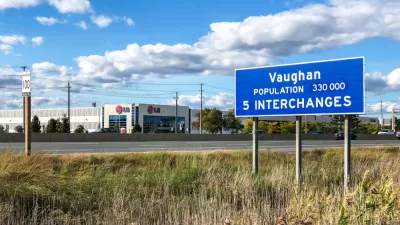In many exurban locations, planners and developers are often enticed by the idea of building urban environments, but without the necessary markets to support them, argues a real estate consultant.
Anthropologists coined the term “Cargo Cults” after World War II for remote island communities in the Pacific that became baffled after modern technology and Western goods disappeared with the troops. These communities would “build crude replicas of Western technology – runways made of palm fronds or radio headsets made of coconuts – because they believed that mimicking the technology would attract the planes full of supplies to which they had been accustomed.”
In real estate, “Cargo Cult Urbanism” occurs when developers and planners create comprehensive plans and zoning regulations with impractical densities and mixes of uses, without ensuring that there is sufficient market demand to support such development.
According to Jonathan Bartlett, Senior Manager at CohnReznick, the best way to avoid Cargo Cult Urbanism is to “thoroughly assess your market and understand what’s really driving real estate demand,” which can help “guide a community from a grand but infeasible vision toward a smaller scale project with enough juice to attract private sector investment and actually lead to real transformation.”
“The last thing we want is to be staring at empty streetscapes, like so many islanders waiting for planes that will never come.”
FULL STORY: Beware of cargo cult urbanism in real estate

Planetizen Federal Action Tracker
A weekly monitor of how Trump’s orders and actions are impacting planners and planning in America.

Maui's Vacation Rental Debate Turns Ugly
Verbal attacks, misinformation campaigns and fistfights plague a high-stakes debate to convert thousands of vacation rentals into long-term housing.

Restaurant Patios Were a Pandemic Win — Why Were They so Hard to Keep?
Social distancing requirements and changes in travel patterns prompted cities to pilot new uses for street and sidewalk space. Then it got complicated.

In California Battle of Housing vs. Environment, Housing Just Won
A new state law significantly limits the power of CEQA, an environmental review law that served as a powerful tool for blocking new development.

Boulder Eliminates Parking Minimums Citywide
Officials estimate the cost of building a single underground parking space at up to $100,000.

Orange County, Florida Adopts Largest US “Sprawl Repair” Code
The ‘Orange Code’ seeks to rectify decades of sprawl-inducing, car-oriented development.
Urban Design for Planners 1: Software Tools
This six-course series explores essential urban design concepts using open source software and equips planners with the tools they need to participate fully in the urban design process.
Planning for Universal Design
Learn the tools for implementing Universal Design in planning regulations.
Heyer Gruel & Associates PA
JM Goldson LLC
Custer County Colorado
City of Camden Redevelopment Agency
City of Astoria
Transportation Research & Education Center (TREC) at Portland State University
Jefferson Parish Government
Camden Redevelopment Agency
City of Claremont





























